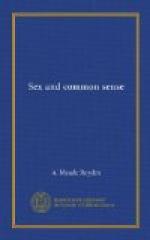Before, then, we can rightly establish our moral standard we have to decide what human nature really is, and when we have done that we shall know what is really moral. I suppose that sounds like a paradox to many, because they think that morality is always “going against” human nature. If people do anything that is generally called “immoral,” they will excuse themselves on the grounds of human nature; they will say: “After all, human nature being what it is, you must expect this, that and the other kind of licence and immorality”; and to say that morality, real morality, can only be based on the realities of human nature will therefore sound to many of you the wildest kind of paradox. But I want to pursue it just as though it were true, because I believe it is true.
What, then, are the realities of our nature? Here is one: a human being is not and never can be cut off from other human beings. He is not alone. He cannot consider himself only. If he does so he violates his own nature, because it is not his nature to be alone, and he cannot act without his actions affecting other people. He cannot think, he cannot feel, he cannot act or speak without affecting other people, and it is futile for anyone to say: “It does not matter to others what I do; nobody knows; it concerns only myself.” Your innermost thought affects the whole world in which you live, and whatever moral standard you are going to adopt, you must take it for granted that your standard will affect other people, and that it is absolutely impossible for you to act or think alone.
And then human beings are three-fold in nature. They have a body, a mind—or what St. Paul calls a “soul”—and a spirit. “Soul” is a word whose meaning we have altered so much that I must define what I mean by it and what I think St. Paul meant by it. The soul includes the emotions and the intellect, that part of a man which is not wholly physical and which is not entirely spiritual. Everyone has a soul. And every one of you, however much you ignore your body, however much you may tell me your body does not really exist, have got a body too. You have to eat and drink and sleep, just like the most material alderman, though you may eat less. And you cannot base a real moral standard on the pretence that you have not got a body. You are, on one side of




